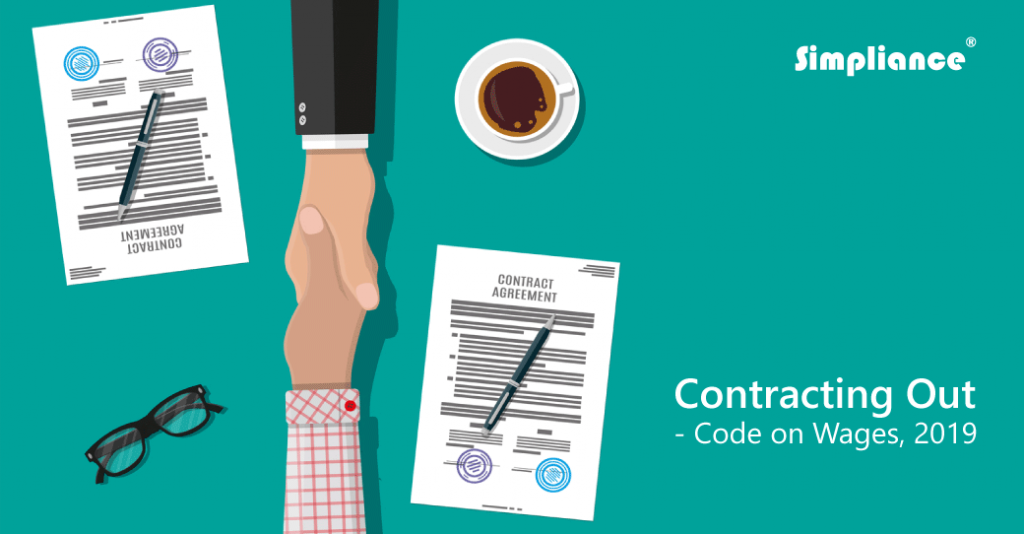
Introduction
The general connotation ascribed to the term ‘contracting out’ consenting to be excluded from a particular scheme or benefit. It requires a legal agreement that operates as a formal statement expressing a person’s intent to be excluded from an official plan or system. As a consequence, it means forgoing a right that one would ordinarily be entitled to.
Most labour enactments in India provide that contracting-out is prohibited, meaning that employers cannot by agreement make an employee forgo a right/benefit they would otherwise be entitled. For example, Section-25 of the Minimum Wages Act, 1948 reads as follows:-
Any contract or agreement, whether made before or after the commencement of this Act, whereby an employee either relinquishes or reduces his right to a minimum rate of wages or any privilege or concession accruing to his under this Act shall be null and void in so far as it purports to reduce the minimum rate of wages fixed under this Act.
The objective of such provisions is to ensure workers are not exploited by employers that are seeking to reduce costs. In a country like India which currently possesses a ‘labour dividend’ i.e. while our population increases, job creation is low, which leads to an excess of labour on the supply side. Due to this, the demand for jobs will increase while supply remains relatively low. In such cases it is easy for employers to dictate terms and conditions of employment. They can do so by mandating waiver of statutory rights/benefits as a precondition to obtaining a job that would merely require a potential employee to enter into an agreement where they contract out of particular benefits.
The above coupled with the unorganized nature of our workforce and a general lack of awareness about workers’ rights could lead to a situation wherein there is large-scale exploitation of labour. Preventing such a scenario from becoming a reality is the reason behind labour welfare legislations explicitly prohibiting contracting out. The following section shall examine contracting out under the Code on Wages, 2019 and its implications.
Contracting Out Under the Code on Wages, 2019: Implications
Section-60 of the Code provides for a prohibition on contracting out, it reads as follows:-
Any contract or agreement whereby an employee relinquishes the right to any amount or the right to bonus due to him under this Code shall be null and void in so far as it purports to remove or reduce the liability of any person to pay such amount under this Code.
The above provision begins with the term any contract or agreement, indicating that the above applies not only to the contract of employment, but also any agreements entered into subsequently. Any agreements that operate to relinquish an employee’s right to any amount or bonus due are declared null and void. The term any amount is broadly worded and can be construed to mean any dues whatsoever under the Code. Another point to note is that it applies not only where it removes the liability of any person to pay such amount, but also where it reduces the same.
The implications of this are multiple, firstly we see that the provision uses the term any person and not an employer. This means it covers individuals in an organization as well as those outside in cases of work arrangements involving multiple parties such as projects with contract labour, independent consultants, fixed term employees, etc.
Second, it prohibits an employer from drafting covenants that require an employee to forgo a particular amount/right. This may be during the full and final settlement or at the time of hiring or during the course of employment. Finally, it also operates to ensure that reductions/relinquishment of liability is not used as a bargaining chip against employees.
In the comments section of our COVID-19 and Termination of Employment blog post, we found several cases of individuals being asked to forgo amounts that are due to them in order to obtain their relieving letter. They were being asked to sign agreements to that effect. Section-60 of the Code on Wages would prohibit this practice and provide employees with adequate protection[S51] .
Another domain where employers need to be careful with their language is in cases of contracts entered into on a principal basis. Such contracts explicitly acknowledge the existence of a principal relationship and implicitly seek to negate the existence of an employer-employee/master-servant relationship. To this end, they often contain clauses wherein a party waives their right to dues. However, if an employer-employee relationship is established based on the contents of the agreement then Section-60 would operate to render the same null and void.
In conclusion, the author believes that the introduction of the above provision is a step in the right direction. It is in consonance with our existing labour jurisprudence that prohibits contracting out where it involves infringement on public rights or policies. Therefore, it is imperative for employers to understand the various consequences of this provision and its implications on contracts entered into with employees, clients and third parties.
Do you have any questions relating to contracting out?
Does your establishment provide contracts with waiver clauses?
Drop your thoughts in the comments below.
| Disclaimer: This blog is meant for informational purposes and discussion only. It contains only general information about legal matters. The information provided is not legal advice and should not be acted upon without seeking proper legal advice from a practicing attorney. Simpliance makes no representations or warranties in relation to the information on this article. |

Animay Singh
Biography

Good article. However, few employers (as mentioned in the article itself) tries to avoid such payment and ask employees to forgo amount in order to obtain relieving letter.
A useful